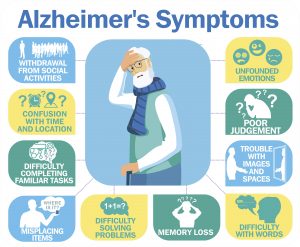Your Brain on Glyphosate + Recovery Techniques
However, there is hope. A preventative and mindful lifestyle works to prevent the loss of neurons, the accumulation of toxic brain proteins, and to reverse memory loss. It turns out that most of the emerging studies do validate the efficacy of a clean lifestyle in preventing brain disease.
The far-reaching effects of brain disease
30 million people worldwide suffer from Alzheimer’s and other forms of dementia. In the United States, 5.3 million people suffer from this specific dementia. That’s one in 8 Americans over the age fo 65. This number doesn’t even include other neurocognitive disorders like Parkinson’s, Amyotrophic Lateral Sclerosis (ALS), autism, Lewy Body Dementia, Vascular Dementia (think strokes), Multiple System Atrophy, or Multiple Sclerosis.
The burden of these diseases cost the US economy billions of dollars each year in direct healthcare costs as well as lost opportunities. For instance, an estimated $100 billion dollars per year is spent on Alzheimer’s disease alone! But the emotional and financial price placed on families of brain disorder victims is not reflected in that astronomical number.
Autism and Parkinsons may not seem similar, but they are both a malfunctioning of the central nervous system that leads to cognitive difficulties. Although we are focusing on the elderly population in this particular article, some of these remedies may be appropriate for younger patients suffering from brain disorders.
It may seem as if these diagnoses are increasing. They are. However, there are several reasons. First, the baby boomer generation is aging and there is a clear link to increasing age and the potential for a brain disease diagnosis. Modern medicine has adopted screening tests that capture more diagnoses than ever before. We even know a few genetic mutations that predispose us to develop brain diseases. However, the environmental risk factors are increasing and cannot be ignored if we wish to truly help curb this frightening disorder that robs us of our essence. I want to stress that the pathogenesis of neurodegenerative conditions is still largely a mystery.
What is brain disease?
Neurodegenerative diseases result from the gradual and progressive loss of neural cells or the myelin sheath, the covering over the nerve cells This leads to nervous system dysfunction.
The environment is often implicated in causing cancer. Cancer is the proliferation of unchecked growth among cells, whereas neurodegeneration is the loss of cells. They feel like they are on opposite ends of the spectrum. However, current research is focused on environmental triggers and toxins and their potential for damaging the nervous system.
My grandfather was diagnosed with Lewy Body dementia. This was in the early 2000s so a diagnosis wasn’t immediate, but we all knew something was terribly wrong. Papaw Charlie just wasn’t himself anymore. I was in high school when he began to claim a small dark haired girl was running wild through his house and interrupting his morning coffee. His wild delusions even fooled us at first. Things progressed quickly, however, and one night my mom even had to rush out to his house after he’d packed his bags and told everyone that aliens were coming to abduct him that night….and he was ready. By the time, he didn’t really smile anymore and had a shuffling gait. We had our diagnosis.
Lewy Body dementia is characterized by abnormal dopamine loss, accumulation of Lewy Body proteins, and inclusions in the brain. It is the second most common form of dementia behind Alzheimer’s. The symptoms are a mix of Parkinson’s and Alzheimer’s symptoms. Patients have emotionless faces, shuffling gaits, are at higher risk for falls, have visual hallucinations, delusions, and sometimes violent behavior due to cognitive decline. It was not easy to watch him slip away, while the shell of his body remained. The saddest part about it all is that evidence indicates that it could be preventable, despite genetic mutations.
Symptoms of early cognitive decline
- Early cognitive defects can be difficult to recognize initially. Get help for yourself or a loved one if you recognize:
- Memory Loss, mostly short term
- Difficulty with word-finding
- Visual perception or hallucinations
- Reasoning and judgment issues
- Inappropriate frustration or unexplained anger

The gut-brain connection
I stress this repeatedly. There is a gut-brain connection. It is complex, and science is just beginning to understand the implications of it.
The brain and the gut communicate bidirectionally, although the gut sends many more messages to the brain than the brain does to the gut. Iin embryology, they originate from the same group of cells and then separate to form the brain and gut. No matter how far apart within our bodies, we are learning they are forever connected. So if your gut is a mess, then this likely means your brain is at risk too. Sugar and the standard American diet are likely culprits in the cause of many patients’ brain fog.
What environmental triggers should you avoid?
The causes of brain deterioration are multifactorial Thus, the answers are not straightforward. Here are some of my best tips for keeping your brain as healthy and as sharp as possible.
“Two forms of fat that are vitally important for brain health are cholesterol and saturated fat.” – Dr. David Perlmuter, author of Grain Brain

- Dietary: DON’T: Eat a diet high in processed carbs and refined sugar. Eliminate high fructose corn syrup, processed foods, food additives, and trans fats. This has been shown to promote inflammation and predispose some people to develop neurocognitive decline. DO: Eat an organic diet high in good fats like seeds, nuts, avocados, olive, or coconut oils as well as a plethora of organic fruits and vegetables. Medium-chain triglycerides found in coconut oil are easier for the brain to break down than the long-chain triglycerides that are more commonly found. Healthy fats feed the brain and keep it functioning properly because over 60% of the brain is made up of DHA, an omega 3, or healthy fat. Omega 3, like DHA, can increase mental clarity and focus. Omega 3 fatty acids can drastically improve mood, memory, and clarity. Protein is also extremely important for a properly functioning brain and for that matter, healthy skin. Aim for 25-30 grams of protein per meal.
- Hormonal: If you suffer from a thyroid condition, estrogen dominance, or low testosterone, this can also affect your mood, vitality, mental clarity, and even personality. Many of these conditions can predispose patients to panic attacks, anxiety, depression, insomnia, and apathy. Many hormones are made and recycled through the gut. Melatonin is partially made in the gut. Serotonin is made in the gut. A large portion of our immune systems is housed in the gut. It is often responsible for our insomnia, anxiety, lowered immunity, and depression. It’s important for thyroid disease patients to cut out soy and gluten as well. Ridding your home of toxic cleaning products, personal care products, makeup, and perfumes that are not natural can also improve hormonal abnormalities. Supplementing with iodine and selenium may also improve thyroid function but be sure to check with a healthcare professional before adding in any supplementation.
- Don’t Lower Your Cholesterol Too Much: The medical system has demonized cholesterol over the years. Low cholesterol is a risk factor in developing neurodegenerative conditions. Cholesterol is actually found in the brain-about 25% of the total. In fact, many hormones, like progesterone, estrogen, cortisol, testosterone, and vitamin D are made from cholesterol. To lower too much may lead to hormonal depletion, which can lead to brain fog, mental decline, and aging. A 2008 study published in the American Journal of Geriatric Psychiatry showed that in the elderly, the best memory function was observed in those with the highest levels of cholesterol!
- Screen for Diabetes: High blood sugars can wreak havoc on brain health by causing inflammation. This happens because when your sugar is consistently high, more insulin is secreted to try to counter it but the problem is… insulin is super inflammatory. Sugars also change the protein structure throughout the body, adding even more inflammation, which the brain is particularly susceptible to. Eat an anti-inflammatory diet full of fruits, vegetables, seeds, nuts, healthy fats, and lean proteins. Get your A1c checked and look for warning signs of diabetes like excessive thirst, urination, dizziness, blurry vision, and fatigue. Anti-inflammatory herbs and supplements include curcumin/turmeric, alpha-lipoic acid, cat’s claw, grape seed extract, frankincense, and CBD oil. Metformin is not a terrible route to treat type 2 diabetes. Natural remedies that also are efficacious include berberine, cinnamon, chromium, and alpha-lipoic acid.
- Test for Pollutants/Heavy Metals: I always advise my patients with cognitive symptoms to be checked for heavy metal toxicities that are often overlooked and unexpected. Lead paints, mercury amalgams, pesticide exposure, and the increasing vaccination schedule all add to the heavy metal load in our bodies. It is wise to look into heavy metal analysis via hair sampling, oral chelation with herbal supplementation. Cilantro with chlorella is also helpful.
- Don’t Forget About Infections: Pathogens like Epstein Barr virus, Lyme, Bartonella, Strep, and candida can lie dormant or exist in biofilms, which remain hidden from the body’s defenses. They use heavy metals as an inflammatory shield. The heavy metals create inflammation that allows the pathogens to take over the body’s defenses. The immune system can have a hard time getting a hold on the infection, depending on your specific genes and predispositions. I personally believe that many of these pathogens remain hidden due to our lack of lab capabilities and they could be responsible for chronic diseases. We don’t understand why most chronic diseases manifest, however, science is getting closer. Recent studies have even suggested that Epstein Barr Virus is behind thyroid disease.
I want you to know that you can prevent many of the neurodegenerative conditions. Most chronic illnesses are preventable, sadly. The power lies with you and your daily choices. Make self-loving choices that your future self will thank you for later!
You can be your own best doctor
Real Progress From
Real People
FREE CARE Plan eBOOK by Dr. Jess, MD.
This system mirrors Dr. Jess MD's steps with patients in her virtual clinic. It’s not a diagnosis, it’s a roadmap; a step-by-step process designed to help people restore function, remove roadblocks, and rebuild resilience.

